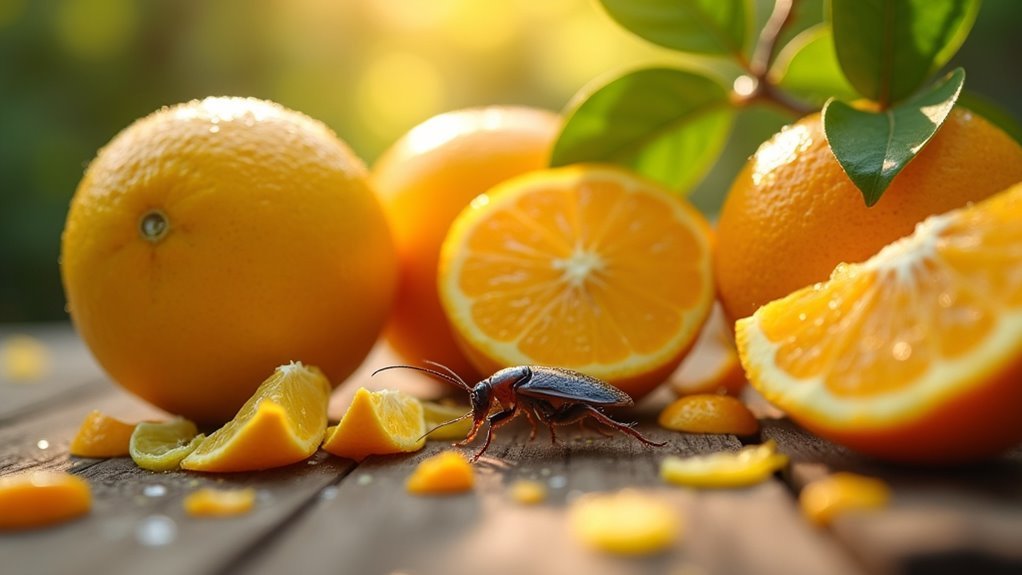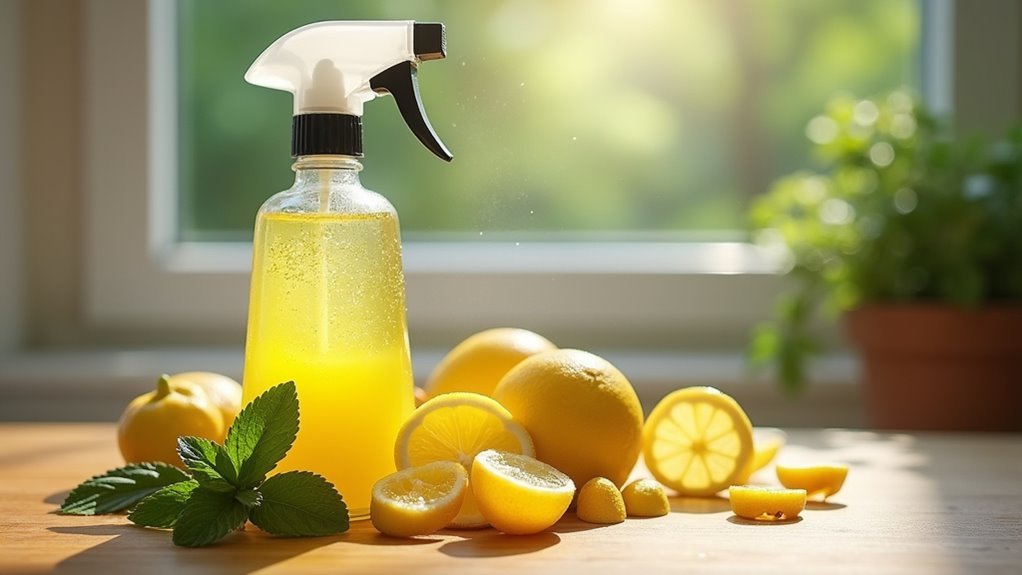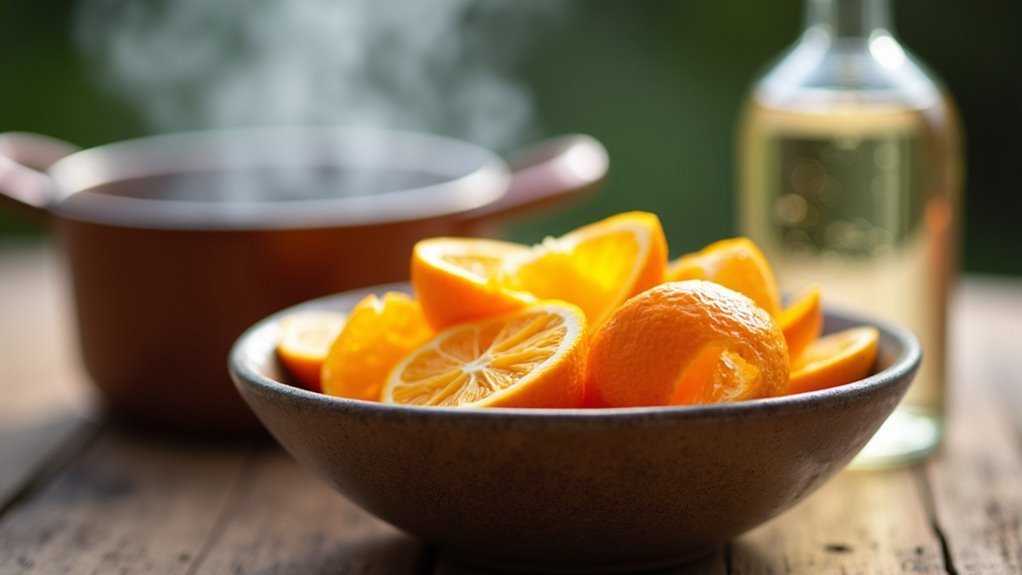You can repel cockroaches using citrus fruits that contain limonene, a compound that overwhelms their sensitive smell receptors. Place fresh lemon, orange, or grapefruit peels in kitchen cabinets and under sinks, replacing them every 3-5 days. Create sprays by mixing lemon essential oil with water and apply around entry points. Use citrus oil diffusers for continuous coverage, or make heated citrus-vinegar solutions for stronger deterrent effects. These methods work best when you combine multiple approaches for thorough protection.
Understanding How Limonene in Citrus Repels Cockroaches

When you’re dealing with unwanted cockroaches, limonene—a natural compound abundant in citrus fruits—acts as a powerful deterrent by overwhelming these pests’ highly sensitive olfactory receptors.
This potent scent disrupts their sensory perception, causing them to flee treated areas immediately. You’ll find that cockroaches possess an exceptionally heightened sense of smell, making them particularly vulnerable to limonene’s intense aroma.
The compound specifically targets German and American cockroach species, creating an inhospitable environment they actively avoid.
When you apply citrus-based solutions, the limonene interferes with their ability to navigate and locate food sources.
This natural repellent mechanism works because cockroaches can’t tolerate the overwhelming citrus fragrance, forcing them to seek alternative locations away from your treated spaces.
Scatter Fresh Citrus Peels in High-Activity Areas
One of the simplest methods to harness limonene’s repellent power involves collecting peels from lemons, oranges, or grapefruits and strategically placing them throughout your home’s high-activity cockroach zones.
Focus on areas where you’ve spotted roaches, particularly kitchens and sinks where they frequently search for food and water. The high concentration of Limonene in fresh citrus peels creates an immediate deterrent that overwhelms cockroach olfactory receptors, forcing them to flee treated areas.
Citrus peels contain high levels of limonene that overwhelm cockroach senses, creating an effective natural barrier in problem areas.
You’ll need to replace the peels regularly to maintain their repellent effectiveness, as the scent fades over time.
Keep peels dry and clean to preserve their properties and prevent messiness. For best results, combine this citrus method with other pest control strategies like thorough cleaning and sealing entry points.
Create a Lemon Juice Spray for Entry Points

You’ll want to create an effective lemon juice spray by mixing 20 drops of lemon essential oil with water in a spray bottle.
Focus your application on key entry points where roaches typically enter your home, including cracks around doors, windows, and any gaps in walls or baseboards.
Apply this natural repellent consistently to maintain its effectiveness, as the citrus scent creates an environment roaches find unpleasant.
Mixing Lemon Juice Solution
Since cockroaches detest citrus scents, creating a lemon juice spray provides an effective and natural way to fortify your home’s entry points against these unwanted pests.
You’ll need 20 drops of lemon essential oil and one cup of water in a spray bottle to create this powerful roach deterrent. Mix the ingredients thoroughly to guarantee proper distribution of the lemon juice concentrate throughout the solution.
This natural repellent works by creating an aromatic barrier that cockroaches find unbearable. The citrus compounds in lemon effectively repel roaches while maintaining a pleasant household fragrance.
For peak cockroach control, shake the bottle before each application to redistribute the oils. The solution remains potent for several days, making it a cost-effective pest management strategy.
Targeting Roach Entry Points
Once you’ve prepared your lemon spray solution, focus your application efforts on the specific areas where roaches typically infiltrate your home.
Target front doors, windows, and small gaps where these pests commonly enter. You’ll want to drip lemon juice directly into cracks and openings around door frames to create an unwelcoming barrier.
Apply your citrus spray generously at these entry points, ensuring thorough coverage of vulnerable areas. For enhanced effectiveness, place shallow bowls filled with fresh lemon juice near these same locations.
This dual approach maximizes your natural deterrents against unwanted invaders. Remember that repelling roaches requires consistent application, so refresh your lemon treatments regularly to maintain their potency and keep your home protected from roach infiltration.
Use Citrus Oil Diffusion for Ambient Protection
You’ll want to choose potent citrus essential oils like lemon, orange, or grapefruit that pack the strongest scent punch against roaches.
Electric diffusers work best for continuous coverage, while reed diffusers offer a gentler, longer-lasting option for smaller spaces.
Position your chosen diffuser strategically in high-traffic roach areas like kitchens and bathrooms to create an invisible barrier they won’t cross.
Essential Oil Selection
Diffusing citrus essential oils transforms your home into an inhospitable environment for cockroaches by creating a continuous aromatic barrier they can’t tolerate.
When selecting citrus oil for roach control, lemon and orange essential oils work exceptionally well because their high limonene content produces a strong scent that repels roaches effectively. These oils deter cockroaches by overwhelming their sensitive olfactory receptors, making treated areas unbearable for both German and American roach species.
For maximum impact, you’ll want to blend citrus oils with complementary essential oils like peppermint or eucalyptus in your diffuser. This combination approach prevents roaches from adapting to single scents while enhancing overall repellent effectiveness.
Remember to maintain consistent diffusion since the aromatic barrier weakens over time, requiring regular reapplication to keep cockroaches away.
Diffusion Methods Explained
Setting up proper diffusion methods amplifies the protective power of citrus oils throughout your living spaces.
Citrus oil diffusion works because roaches hate the strong limonene scent that interferes with their olfactory receptors, creating an effective repellent barrier.
Here’s how to maximize your diffusion effectiveness:
- Add citrus essential oil with water to your diffuser, using 3-5 drops of lemon or orange oil per session.
- Position diffusers strategically in areas with high roach activity like kitchens, bathrooms, and basements.
- Run diffusion cycles regularly throughout the day, as effectiveness diminishes over time.
- Combine with other methods such as maintaining cleanliness and sealing entry points for enhanced protection.
Consistent diffusion guarantees the citrus aroma permeates your home continuously.
Make a Heated Citrus Peel and Vinegar Solution

When you combine citrus peels with white vinegar and heat them together, you’ll create a powerful roach-repelling solution that harnesses the natural oils within the peels.
Citrus fruits contain limonene, which releases during the boiling process along with other essential oils that enhance the mixture’s effectiveness.
After heating until boiling, strain out the solid peels and pour the liquid into a spray bottle for convenient application.
These natural scents can help deter roaches when applied around entry points, kitchens, and sinks.
Strategic placement around doorways, cabinet edges, and plumbing fixtures maximizes the citrus solution’s roach-deterring potential throughout your home.
Refresh the solution every few days since the aroma weakens over time and cockroaches adapt to diminished scents.
While this method offers an eco-friendly approach, severe infestations may require professional extermination for complete elimination.
Apply Concentrated Citrus Oils to Cotton Balls
Concentrated citrus oils offer another effective method for repelling cockroaches through their potent limonene content.
These powerful oils create a natural repellent that disrupts cockroaches’ olfactory receptors, forcing them to flee treated areas.
Follow these steps to implement this cotton balls method:
- Saturate cotton balls with several drops of concentrated lemon or orange oil
- Place strategically in high-activity areas like kitchens, sinks, and corners where you’ve observed roach movement
- Refresh regularly by adding more citrus oils as the scent diminishes and loses effectiveness over time
- Combine with other methods for enhanced pest control results as part of your integrated management strategy
The strong citrus aroma effectively interferes with cockroaches’ sensory navigation, making this repellent approach both natural and practical for ongoing pest prevention.
Combine Multiple Citrus Varieties for Enhanced Effect
You’ll maximize your roach-repelling power by mixing different citrus types like lemons, oranges, and grapefruits instead of relying on just one variety.
Rotate your citrus applications weekly to prevent cockroaches from adapting to familiar scents.
Layer multiple citrus methods together—combine fresh peels with essential oil sprays and cotton ball treatments for extensive coverage.
Mixing Different Citrus Types
Although individual citrus fruits work well against roaches, combining multiple varieties creates a significantly stronger deterrent effect.
Mixing different citrus types produces a complex aroma that’s more challenging for cockroaches to tolerate or adapt to over time.
Here’s how to maximize your strong citrus repellent strategy:
- Blend fresh peels from lemons, oranges, and grapefruits to create diverse fragrance profiles that target different roach species effectively.
- Combine lemon and orange oils into concentrated spray solutions for enhanced potency against persistent cockroach activity.
- Apply mixed citrus juice from multiple fruits to create an overwhelming scent barrier in problem areas.
- Experiment with different combinations to discover what works best for your specific situation and eliminate an infestation more efficiently.
Rotating Citrus Applications Weekly
When you rotate different citrus varieties weekly, you’ll prevent cockroaches from becoming accustomed to any single scent while maintaining maximum repellent effectiveness.
This rotating citrus applications strategy guarantees roaches can’t adapt to your defense system.
Start with lemon juice one week, then switch to orange peels the next. Follow with grapefruit citrus oils in week three before cycling back.
This rotation takes advantage of varying Limonene concentrations and distinct aromatic profiles found in different fruits.
Apply your chosen citrus solution throughout potential entry points and problem areas each week.
The constantly changing scents overwhelm cockroach olfactory receptors, creating confusion and driving them away consistently.
You’ll prevent roaches from establishing patterns while maximizing your natural repellent’s potency against multiple species.
Layering Multiple Citrus Methods
By combining multiple citrus varieties simultaneously, you create a powerhouse blend that delivers markedly stronger repellent effects than single-fruit applications.
Layering multiple citrus methods amplifies the limonene concentration, overwhelming cockroach olfactory receptors with scents that repel effectively.
Here’s your all-encompassing approach for deterring roaches:
- Scatter mixed peels – Distribute lemon, orange, and grapefruit peels throughout roach-prone areas for sustained scent release.
- Deploy citrus oil diffusion – Run diffusers with blended citrus oils to maintain continuous aromatic barriers.
- Apply DIY citrus spray – Create powerful surface treatments using combined lemon and orange juice concentrates.
- Rotate variety combinations – Alternate between different citrus blends weekly to prevent adaptation.
This multi-layered strategy guarantees maximum potency while maintaining long-term effectiveness against various roach species.
Strategic Placement Around Kitchen and Bathroom Areas
Since roaches gravitate toward kitchens and bathrooms for food scraps and moisture, you’ll need to strategically position citrus deterrents in these high-traffic areas.
Focus your citrus spray application around entry points like doorways and windows, where roaches typically infiltrate. Scatter fresh citrus peels inside kitchen cabinets, under sinks, and around trash bins to create immediate barriers.
Place bowls of lemon juice in corners where roaches commonly search for water sources. Your strategic placement should target areas where roaches feel most comfortable hiding and foraging.
Combine these citrus methods with thorough cleaning practices to eliminate food residue and moisture. Remember to refresh peels and reapply sprays every few days, ensuring the Limonene concentration remains strong enough to disrupt roaches’ sensory perception effectively.
Regular Replacement Schedule for Maximum Potency
The potency of citrus deterrents decreases rapidly once exposed to air, making a consistent replacement schedule crucial for maintaining their roach-repelling properties.
Citrus deterrents lose effectiveness quickly when exposed to air, requiring frequent replacement to maintain their roach-repelling strength.
You’ll need regular replacement to achieve peak potency and prevent roaches from adapting to familiar scents.
Follow this schedule for ideal repellent strength:
- Replace citrus peels every 3-5 days to maintain high Limonene concentration and strong deterrent effects.
- Reapply citrus oil sprays every few days since evaporation greatly reduces their effectiveness over time.
- Refresh all citrus solutions simultaneously to create consistent scent barriers throughout your home.
- Combine replacements with thorough cleaning to eliminate food sources and enhance overall deterrence.
This proactive approach guarantees your citrus deterrents remain effective against various roach species while preventing pest adaptation to diminished scent levels.
Integrate Citrus Methods With Other Natural Deterrents
Although citrus methods work effectively on their own, you’ll achieve superior roach control when you combine them with complementary natural deterrents that target different sensory pathways.
Enhance your citrus sprays by adding essential oils like peppermint or eucalyptus, which disrupt roaches’ olfactory senses. Scatter citrus peels alongside bay leaves in cabinets and pantries to create multi-layered barriers.
Apply citrus solutions with crushed garlic or cayenne pepper to address both smell and taste aversions. Combine these natural deterrents with strict cleanliness practices—seal food in airtight containers and eliminate water sources.
For extensive pest management, incorporate diatomaceous earth around citrus-treated areas. This lethal addition dehydrates roaches on contact while citrus continues to repel roaches from entering your space.
Frequently Asked Questions
Does Citrus Keep Cockroaches Away?
Yes, citrus does keep cockroaches away. You’ll find that limonene in citrus overwhelms their sensitive smell receptors, making them flee. However, you’ll need regular applications since the scent fades and won’t eliminate existing infestations.
How to Make Citrus Spray for Cockroaches?
Combine 20 drops of lemon or orange essential oil with water in a spray bottle. You can also boil citrus peels in white vinegar, then strain the mixture for a potent homemade solution.
What Smell Do Roaches Hate the Most?
You’ll find that roaches hate citrus scents most, especially lemon and orange. The limonene compound overwhelms their olfactory receptors, making them flee. Peppermint and eucalyptus also work, but citrus remains most effective.
How to Use Lemon to Get Rid of Cockroaches?
You’ll mix 20 drops of lemon essential oil with water in a spray bottle, then apply around entry points and kitchens. Scatter fresh lemon peels in roach hotspots and replace regularly.
In Summary
You’ll find these citrus-based methods work best when you’re consistent with application and replacement. Don’t rely on just one technique—combine several approaches like peels, sprays, and oils for maximum effectiveness. Remember that citrus won’t eliminate existing infestations but serves as an excellent preventive measure. Keep experimenting with different citrus varieties and placement locations until you discover what works best for your specific roach problem areas.





Leave a Reply